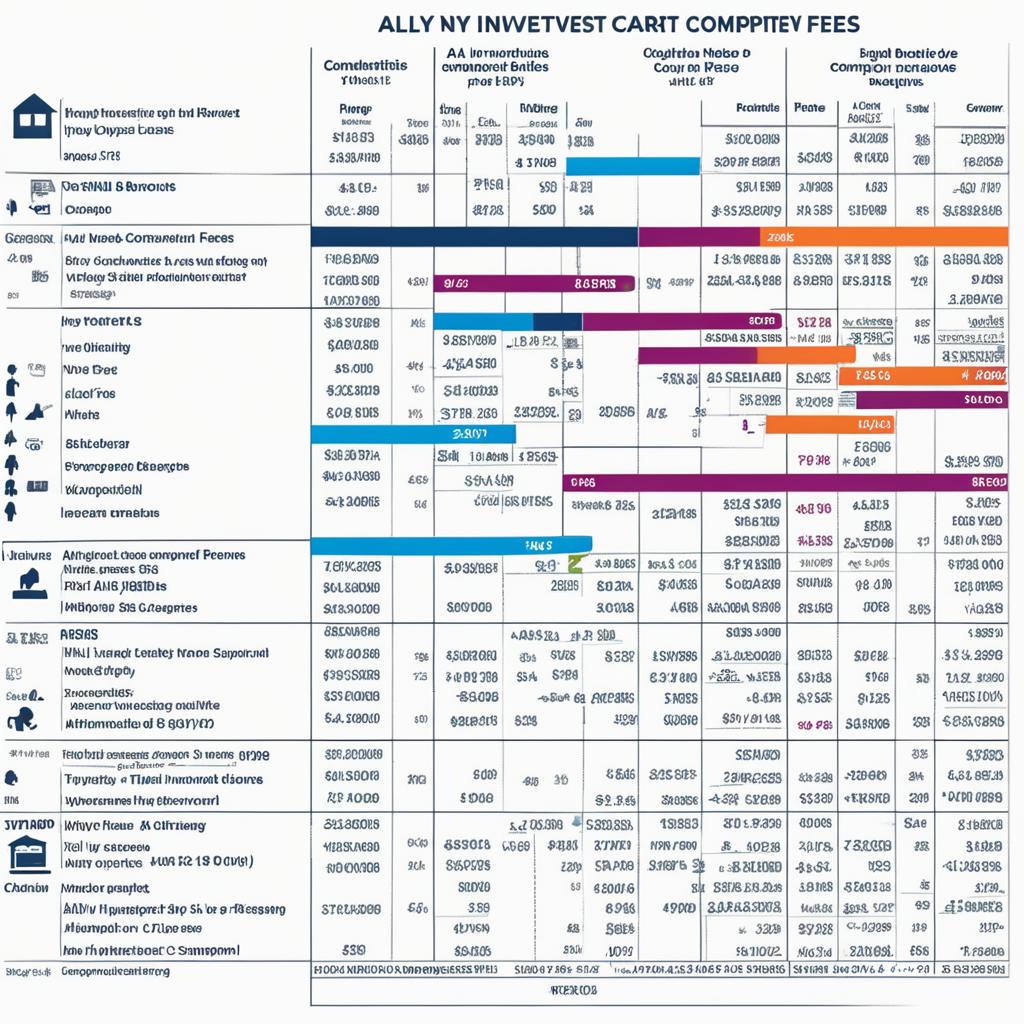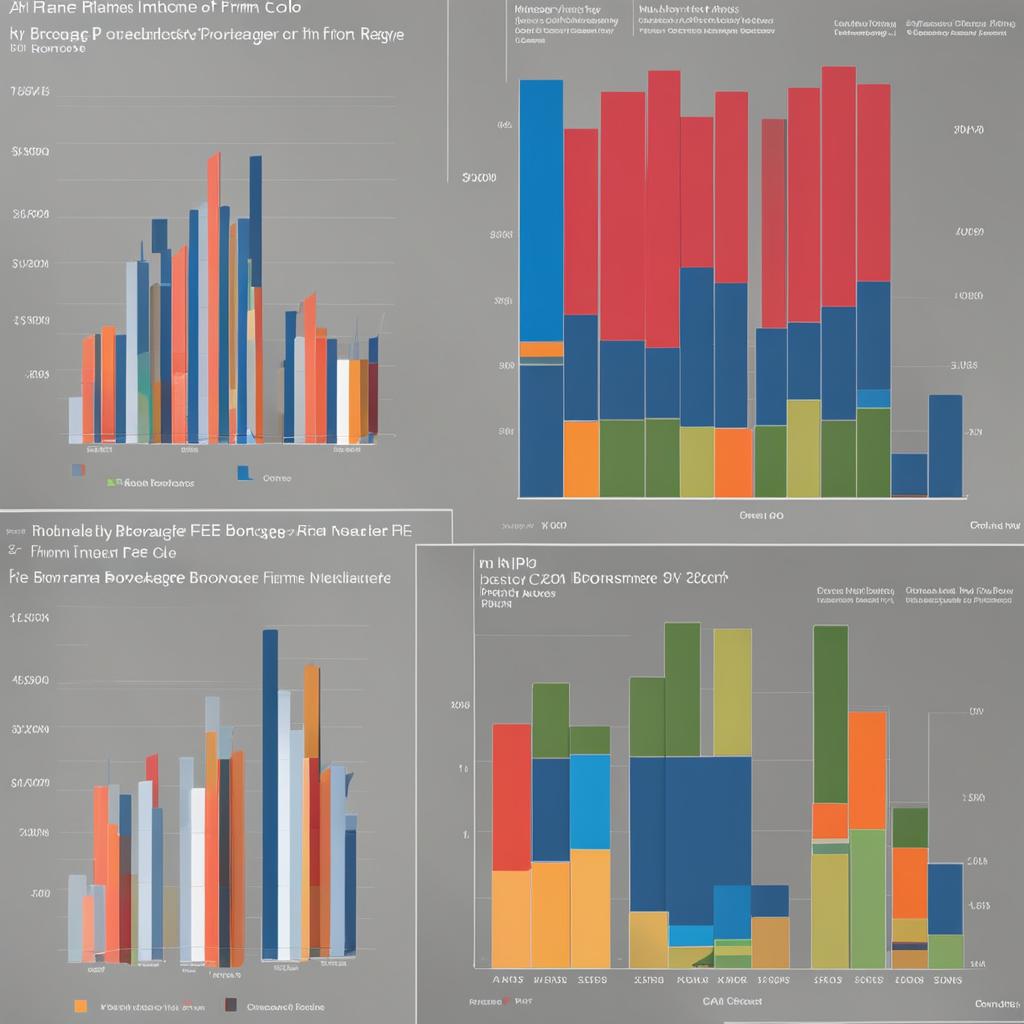When it comes to investing, selecting the right brokerage firm is crucial. One of the most important factors to consider is the fees charged by each firm. In this article, I will compare the brokerage fees of top firms in the market.
Key Takeaways:
- Comparing brokerage fees is essential in choosing the right brokerage firm.
- Consider factors other than fees, such as customer support and mobile experience.
- Low-cost brokerage fees don’t necessarily equate to the best brokerage fees.
- Use a brokerage fee calculator to estimate potential costs for your investment strategy.
- Research online brokerage fees and compare stock trading fees to find the best deal.
Comparing Fees for the Top Brokerage Firms
In this section, I will compare the fees charged by some of the top brokerage firms in the market, including TD Ameritrade, Charles Schwab, Ally Invest, Fidelity, E*Trade, Merrill Edge, and TradeStation.
When it comes to selecting the right brokerage firm, it’s important to consider various factors, and fees play a crucial role in this decision-making process. Let’s take a closer look at how these top brokerage firms compare in terms of their fees.
Fee Comparison Table
| Brokerage Firm | Commission-Free Stock Trades | Mutual Fund Trade Fee | Broker-Assisted Trade Fee |
|---|---|---|---|
| TD Ameritrade | Yes | $49.99 | $44.99 |
| Charles Schwab | Yes | $49.95 | $25 |
| Ally Invest | Yes | $9.95 | $20 |
| Fidelity | Yes | $49.95 | $32.95 |
| E*Trade | Yes | $19.99 | $25 |
| Merrill Edge | No | $19.95 | $29.95 |
| TradeStation | Yes | $14.95 | $50 |
As you can see, these top brokerage firms offer a range of fees for different types of trades. Some firms, such as TD Ameritrade, Charles Schwab, Ally Invest, Fidelity, E*Trade, and TradeStation, provide commission-free stock trades, while others, like Merrill Edge, charge a fee for every trade.
It’s important to note that the fees listed in the table may vary based on account types, transaction types, and other factors. Make sure to review each brokerage firm’s fee schedule and terms of service for more accurate and up-to-date information.
Now that we have compared the fees of these top brokerage firms, let’s delve deeper into each firm’s offerings and features in the following sections.
TD Ameritrade
When it comes to online stockbrokers, TD Ameritrade is a name that stands out. They offer a user-friendly trading platform that caters to both beginner and experienced investors. With competitive prices and a range of services, TD Ameritrade is a popular choice for those looking to invest in the stock market.
One of the key advantages of TD Ameritrade is their lack of minimum deposit requirement. This means that investors can get started with any amount they feel comfortable with, making it accessible to investors of all levels. Furthermore, TD Ameritrade offers commission-free ETF trades, allowing investors to diversify their portfolios without incurring additional costs.
Although TD Ameritrade provides many services at no cost, they do have certain fees in place. For instance, there is a $49.99 fee for mutual fund trades and a $44.99 fee for broker-assisted trades. These fees should be taken into consideration when planning your investment strategy.
“TD Ameritrade provides a user-friendly platform and competitive prices, making it a popular choice among investors looking to trade stocks and ETFs.”
Overall, TD Ameritrade offers a comprehensive trading experience with a platform that is easy to navigate and understand. Their commission-free ETF trades and lack of minimum deposit requirement make it an attractive option for investors of all levels. However, it’s important to consider the fees associated with mutual fund trades and broker-assisted trades before making a decision.
TD Ameritrade Fee Summary
| Fee Type | Amount |
|---|---|
| Commission-free ETF trades | No cost |
| Mutual fund trade fee | $49.99 |
| Broker-assisted trade fee | $44.99 |
Continue reading to learn more about the fees and services offered by other top brokerage firms.
Charles Schwab
When it comes to top brokerage firms, Charles Schwab stands out for its exceptional customer support and superior online trading platform. As an investor, you want a brokerage that not only offers competitive fees but also provides a seamless and user-friendly trading experience. With Charles Schwab, you get the best of both worlds.
One of the key advantages of Charles Schwab is that they have no minimum deposit requirement. This means that whether you are a seasoned investor or just starting, you can open an account and begin trading without any financial constraints. This flexibility makes it accessible for investors of all levels.
In addition to the absence of a minimum deposit, Charles Schwab offers commission-free stock trades. This is a significant benefit as it allows investors to buy and sell stocks without incurring additional fees, resulting in potential cost savings over time. The freedom to trade without worrying about brokerage fees can have a positive impact on your investment returns.
However, it is important to note that Charles Schwab does have other fees for certain transactions. For mutual fund trades, there is a $49.95 fee, and if you require broker-assisted trading, there is a $25 fee. While these fees are higher compared to their commission-free stock trades, they are still competitive within the industry.
| Service | Fee |
|---|---|
| Commission-Free Stock Trades | $0 |
| Mutual Fund Trade | $49.95 |
| Broker-Assisted Trade | $25 |
Overall, Charles Schwab offers a comprehensive brokerage service with its exceptional online trading platform and competitive fees. Whether you are an experienced investor or just starting out, Charles Schwab provides the necessary tools and support to help you achieve your investment goals.
As an image description, the alt tag is “Charles Schwab online trading platform”. The image showcases the modern and intuitive online trading platform that Charles Schwab offers, highlighting its user-friendly interface and advanced features to enhance your trading experience.
Ally Invest
Looking for a brokerage that offers low-cost trading? Look no further than Ally Invest. With Ally Invest, you can enjoy the benefits of low-cost trading including $0 commissions and no account minimums. Whether you’re a seasoned investor or just starting out, Ally Invest has got you covered.
One of the standout features of Ally Invest is its user-friendly platform that makes trading hassle-free. You can easily navigate through the platform and execute trades with just a few clicks. Not only that, but Ally Invest also provides a variety of research tools to help you make informed investment decisions.
Let’s take a closer look at the fees charged by Ally Invest:
| Fees | Amount |
|---|---|
| Mutual Fund Trade Fee | $9.95 |
| Broker-Assisted Trade Fee | $20 |
As you can see, Ally Invest keeps its fees competitive, allowing you to keep more of your investment returns. So whether you’re trading stocks, ETFs, or mutual funds, Ally Invest offers a cost-effective solution for your investment needs.
Take advantage of Ally Invest’s low-cost trading and start maximizing your investment potential today!

Fidelity
When it comes to investing in mutual funds, Fidelity is a top choice for many investors. With Fidelity, you get wide access to a diverse range of mutual funds, allowing you to build a well-rounded portfolio tailored to your investment goals. They offer a wide variety of funds, including domestic and international equity funds, bond funds, sector funds, and more.
One of the standout features of Fidelity is their zero-fee index funds. These funds are designed to track the performance of a specific market index, such as the S&P 500, and come with no expense ratio, meaning you keep more of your investment returns. This can be especially beneficial for long-term investors looking for low-cost investment options.
Additionally, Fidelity offers commission-free trading, allowing you to buy and sell mutual funds without incurring any trading fees. This can help reduce the overall cost of investing and maximize your returns.
While Fidelity offers a great selection of mutual funds and competitive pricing, it’s important to note that they do charge certain fees. For mutual fund trades, Fidelity charges a fee of $49.95 per trade. If you require broker-assisted trades, there is a fee of $32.95 per trade.
Overall, Fidelity provides investors with wide access to mutual funds, including zero-fee index funds, and offers commission-free trading. It’s worth considering Fidelity as an option for your investment needs.
| Brokerage Firm | Mutual Fund Trade Fee | Broker-Assisted Trade Fee |
|---|---|---|
| Fidelity | $49.95 | $32.95 |
| TD Ameritrade | $49.99 | $44.99 |
| Charles Schwab | $49.95 | $25 |
| Ally Invest | $9.95 | $20 |
| E*Trade | $19.99 | $25 |
| Merrill Edge | $19.95 | $29.95 |
| TradeStation | $14.95 | $50 |
“Fidelity offers wide access to mutual funds and zero-fee index funds, making it an attractive choice for long-term investors.”
E*Trade
When it comes to full-service brokers, E*Trade is a top choice for investors. They offer a comprehensive range of investment options, including mutual funds and exchange-traded funds (ETFs). As a full-service broker, E*Trade provides a wealth of research and educational resources to help investors make informed decisions.
One of the standout features of E*Trade is their commission-free stock trades. This allows investors to buy and sell stocks without incurring any additional fees. Additionally, E*Trade offers a selection of low-cost ETFs, providing automatic diversification for those looking to build a balanced portfolio.
Here is a breakdown of E*Trade’s fees:
| Type of Trade | Fee |
|---|---|
| Mutual Fund Trade | $19.99 |
| Broker-Assisted Trade | $25 |
With their competitive pricing and wide range of investment options, E*Trade is an excellent choice for investors who value a full-service brokerage experience. Whether you’re a seasoned investor or just starting out, E*Trade provides the tools and resources you need to make informed investment decisions.

Merrill Edge
When it comes to brokerage services for Bank of America customers, Merrill Edge stands out as a top choice. With a reputation for providing a great trading experience and a robust support system, Merrill Edge offers a range of features that cater to the needs of investors.
One of the standout advantages of Merrill Edge is its branch support system. Having the ability to visit a physical location and receive personalized assistance can be invaluable, particularly for individuals who prefer face-to-face interactions or have complex investment needs.
Furthermore, Merrill Edge offers competitive pricing that appeals to investors of all levels. While the fees include a $19.95 mutual fund trade fee and a $29.95 broker-assisted trade fee, the overall value provided through their comprehensive trading tools and resources more than justifies the cost.
Merrill Edge prioritizes a seamless trading experience and offers a user-friendly platform that caters to both beginner and experienced traders. The platform boasts advanced charting tools, real-time quotes, and customizable dashboards, empowering investors to make informed decisions based on market movements.
Branch Support and Competitive Pricing
With Merrill Edge, I appreciate the availability of branch support, which provides me with peace of mind knowing that I can access in-person assistance when needed. Additionally, the competitive pricing ensures that I can keep my trading costs in check while still benefiting from a comprehensive trading experience.
I’ve been a Bank of America customer for years, and leveraging Merrill Edge as my brokerage service has been an excellent decision. The branch support and competitive pricing truly set them apart from other providers in the industry. – Tom S.
| Fee Type | Amount |
|---|---|
| Mutual Fund Trade Fee | $19.95 |
| Broker-Assisted Trade Fee | $29.95 |
Whether you’re just starting out or have years of trading experience, Merrill Edge offers a comprehensive platform with features that cater to your unique needs. The combination of a user-friendly interface, branch support, and competitive pricing makes Merrill Edge an excellent choice for investors seeking a top-notch trading experience.
TradeStation
TradeStation is an exceptional platform for active traders, providing a comprehensive suite of features tailored to meet the unique needs of experienced investors. With TradeStation, you can access an advanced trading platform, cutting-edge research tools, and a wide range of investment options.
One of the standout features of TradeStation is its commitment to commission-free trading. This means that you can execute trades without any additional charges, allowing you to keep more of your investment returns. Whether you’re trading ETFs, options, stocks, or mutual funds, TradeStation offers a seamless and cost-effective trading experience.
TradeStation also offers an extensive collection of research tools to help you make informed investment decisions. From real-time market analysis to customizable charting functionalities, TradeStation empowers you with the insights and data you need to stay ahead of the market.
TradeStation Fees
While TradeStation excels in offering commission-free trading, it’s important to be aware of the associated fees. Here is a breakdown of the fees charged by TradeStation:
| Trade Type | Fee |
|---|---|
| Mutual Fund Trade | $14.95 |
| Broker-Assisted Trade | $50 |
It’s essential to consider these fees when trading on the TradeStation platform, as they can impact your overall investment performance. However, with commission-free trading and advanced research tools, TradeStation remains a top choice for active traders seeking a robust trading experience.

TradeStation provides active traders with a powerful platform and commission-free trading, making it an attractive option for those who engage in frequent trades.
Do Brokerage Fees Matter?
In this section, we will discuss the impact of brokerage fees on investment returns. While $0 commissions may seem enticing, the average investor doesn’t actively trade, so the fees may not have a significant impact on their overall returns. It’s important to understand that brokerage fees are just one component of the investment process and should be considered alongside other factors.
When evaluating brokerage fees, it’s crucial to look beyond the surface level and assess the overall value provided by the firm. Factors such as customer support, research tools, trading platform usability, and investment options should be taken into account. These aspects can significantly impact the overall investment experience, potentially outweighing the impact of brokerage fees.
While it’s true that high brokerage fees can eat into your returns, it’s essential to strike a balance. Low-cost brokerage fees may not always translate to the best investment outcomes. It’s crucial to choose a brokerage that aligns with your specific needs and experience as an investor. Consider factors such as investment goals, trading frequency, account minimums, and the type of investments you plan to make.
At the end of the day, investing is about making informed decisions based on your unique circumstances. Focusing solely on brokerage fees without considering the broader picture may lead to suboptimal investment outcomes.
If you’re an active trader who frequently buys and sells securities, brokerage fees can have a more significant impact on your returns. In such cases, opting for a brokerage with lower trading fees or discounted commission structures may be beneficial. However, for long-term investors who hold onto their investments for extended periods, the impact of brokerage fees on their overall returns may be negligible.
It’s worth noting that some brokerages offer fee calculators or tools that help you estimate the impact of trading fees on your investment returns. These calculators can be handy in determining the potential cost-effectiveness of different brokerage options.
Considerations When Evaluating Brokerage Fees:
- Understand your trading style and frequency
- Assess the range of investment options offered
- Consider the quality of research tools and educational resources
- Evaluate the trading platform’s usability and features
- Examine the level of customer support provided
Ultimately, the decision to choose a brokerage should involve a comprehensive evaluation of multiple factors, with brokerage fees being just one piece of the puzzle. By considering your specific needs, weighing the various features and benefits offered by different brokerages, and understanding the potential impact of fees on your investment returns, you can make a more informed decision that aligns with your goals.
Remember, successful investing is about finding the right balance between cost-efficiency and the overall value provided by the brokerage.
Tips for Selecting the Right Brokerage
When it comes to selecting a brokerage firm, there are several factors to consider that can greatly impact your investing experience. In this section, I’ll provide you with some valuable tips to help you make an informed decision.
Prioritize Customer Support
Customer support is an essential aspect of any brokerage firm. Look for a brokerage that offers excellent customer service and support channels that are easily accessible. This ensures that you can reach out for assistance whenever you need it, whether you have a question about a trade or encounter any technical difficulties.
Consider the Mobile Experience
In today’s digital age, having a user-friendly and intuitive mobile trading platform is crucial. Many investors prefer to monitor their investments and trade on the go, so it’s important to choose a brokerage that offers a robust mobile experience. Look for a brokerage that has a mobile app that is compatible with your device and offers all the features you need for seamless trading.
Research and Read Customer Reviews
Before making a final decision, take the time to research and read customer reviews about the brokerage firms you are considering. This will give you valuable insights into the experiences of other investors with the firm. Pay attention to comments about the reliability of the platform, the speed of execution, and the overall customer satisfaction. This information will help you gauge whether a particular brokerage is the right fit for you.
“I found it invaluable to read customer reviews before choosing my brokerage firm. It gave me a better understanding of their strengths and weaknesses and allowed me to make a more informed decision.” – John Smith, experienced investor
Compare Fees and Commissions
While fees shouldn’t be the sole deciding factor, it’s important to compare the fees and commissions charged by different brokerage firms. Look for transparent fee structures and consider the impact these fees will have on your overall returns. Remember to weigh the fees against the value of the services provided to ensure you are getting the best bang for your buck.
Brokerage Comparison
| Brokerage | Customer Support | Mobile Experience | Fee Structure |
|---|---|---|---|
| TD Ameritrade | 24/7 Phone Support, Live Chat | User-Friendly Mobile App | Commission-Free ETFs, Mutual Fund Trade Fee: $49.99, Broker-Assisted Trade Fee: $44.99 |
| Charles Schwab | 24/7 Phone Support, Live Chat, Branch Support | Intuitive Mobile App | Commission-Free Stocks, Mutual Fund Trade Fee: $49.95, Broker-Assisted Trade Fee: $25 |
| Ally Invest | 24/7 Phone Support, Live Chat | User-Friendly Mobile App | Commission-Free Trading, Mutual Fund Trade Fee: $9.95, Broker-Assisted Trade Fee: $20 |
| Fidelity | 24/7 Phone Support, Live Chat | Advanced Mobile App | Commission-Free Trading, Mutual Fund Trade Fee: $49.95, Broker-Assisted Trade Fee: $32.95 |
| E*Trade | 24/7 Phone Support, Live Chat | Robust Mobile App | Commission-Free Stocks, Mutual Fund Trade Fee: $19.99, Broker-Assisted Trade Fee: $25 |
These are just a few tips to help you select the right brokerage firm. Remember to prioritize customer support, consider the mobile experience, research and read customer reviews, and compare fees and commissions. By doing thorough research, you’ll be able to choose a brokerage that aligns with your investment goals and provides the resources and support you need for a successful investing journey.

Are Brokerage Fees Tax-Deductible?
One common question investors often ask is whether brokerage fees are tax-deductible. Unfortunately, according to the Tax Cuts and Jobs Act implemented in 2018, brokerage fees are no longer tax-deductible.
While it may be disappointing news for investors hoping to offset their investment fees, it’s important to understand the reasons behind this change. The Tax Cuts and Jobs Act aimed to simplify the tax code and reduce the overall tax burden for individuals and businesses. As a result, many itemized deductions, including the deduction for brokerage fees, were eliminated.
This means that any fees incurred from buying or selling securities or managing investments cannot be claimed as tax deductions. It’s important to keep this in mind when planning your investments and considering the associated costs.
However, it’s worth noting that there may still be other tax advantages available when it comes to investing. For example, contributions to retirement accounts such as 401(k)s and IRAs may be tax-deductible or offer tax-free growth. Additionally, certain investment expenses, such as fees for financial planning or investment advisory services, could still be eligible for tax deductions as miscellaneous itemized deductions.
Consulting with a qualified tax professional will provide you with the most accurate and up-to-date information regarding tax deductions and how they may apply to your specific financial situation.
Conclusion
After comparing the brokerage fees of top firms in the market, it is evident that pricing is indeed an important factor to consider when selecting a brokerage firm. However, it should not be the sole determining factor.
I encourage you to prioritize customer support and consider the mobile experience offered by each firm. These elements play a crucial role in ensuring a smooth and seamless trading experience. Additionally, it is vital to find a brokerage that aligns with your specific needs and investment goals.
In summary, while comparing brokerage fees is essential, it is equally important to look beyond the numbers. Take into account factors such as customer support, mobile experience, and the overall suitability of the brokerage for your individual investment strategy. By doing so, you can confidently select a brokerage firm that will best serve your financial needs.
FAQ
Are there any brokerage firms that offer commission-free trading?
Yes, there are several brokerage firms, such as TD Ameritrade, Charles Schwab, Ally Invest, Fidelity, E*Trade, Merrill Edge, and TradeStation, that offer commission-free trades on certain investments.
What are some of the additional fees charged by brokerage firms?
In addition to trading commissions, brokerage firms may charge fees for mutual fund trades, broker-assisted trades, and other services. The fees vary depending on the specific firm.
Do all brokerage firms have a minimum deposit requirement?
No, not all brokerage firms have a minimum deposit requirement. Some firms, like TD Ameritrade and Ally Invest, have no minimum deposit requirement.
How do I compare brokerage fees?
To compare brokerage fees, you can use online brokerage fee calculators, compare the fees charged by different firms, and consider the specific investment products you plan to trade.
Are brokerage fees tax-deductible?
No, brokerage fees are not tax-deductible since the Tax Cuts and Jobs Act came into effect in 2018.
What should I consider when selecting a brokerage firm?
When selecting a brokerage firm, it’s important to consider factors such as customer support, the mobile trading experience, the range of investment products offered, and any additional services or tools provided.
Do brokerage fees have a significant impact on investment returns?
For the average investor who doesn’t actively trade, brokerage fees may not have a significant impact on investment returns. However, for active traders or those with a high trading volume, low-cost brokerage fees can help maximize returns.
Our Friends
- https://millennialmoney.com/brokerage-fees-comparison/
- https://www.nerdwallet.com/article/investing/brokerage-commissions-fees
- https://www.gobankingrates.com/investing/brokerage/brokerage-fees-comparison/
Money posts:
 What is a Broker-Dealer? (2024)
What is a Broker-Dealer? (2024)
 7 Best Trading Platforms (2024)
7 Best Trading Platforms (2024)
 ETF vs Mutual Funds: Key Differences and Similarities (2024)
ETF vs Mutual Funds: Key Differences and Similarities (2024)
 Best Online Stock Brokers for Beginners in September (2024)
Best Online Stock Brokers for Beginners in September (2024)
 Tastytrade (formerly Tastyworks) Review (2024)
Tastytrade (formerly Tastyworks) Review (2024)
 9 Best Penny Stock Trading Apps in 2024
9 Best Penny Stock Trading Apps in 2024
 Vanguard Review (2024)
Vanguard Review (2024)
 Ally Invest Review | Online Investment Brokerage (2024)
Ally Invest Review | Online Investment Brokerage (2024)

